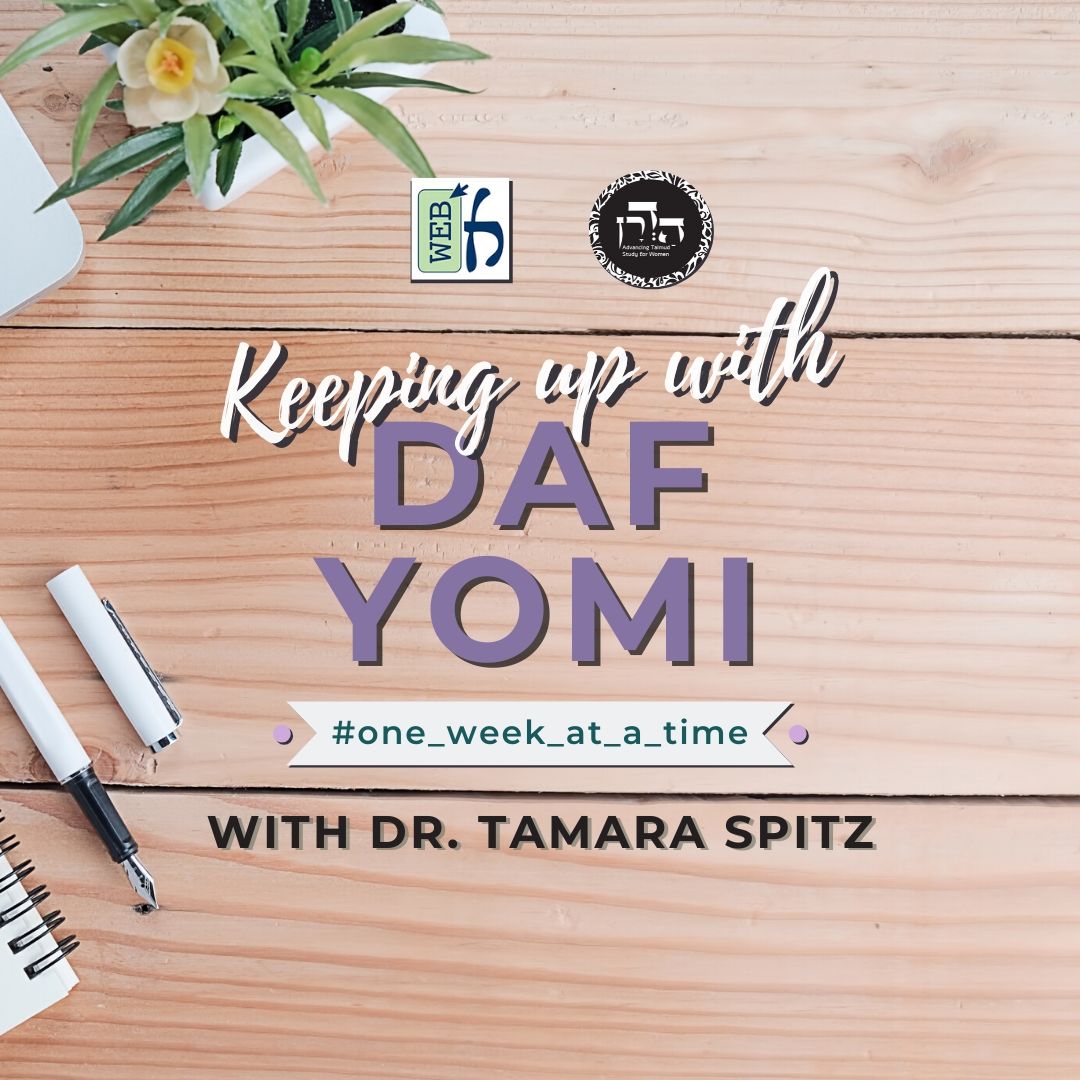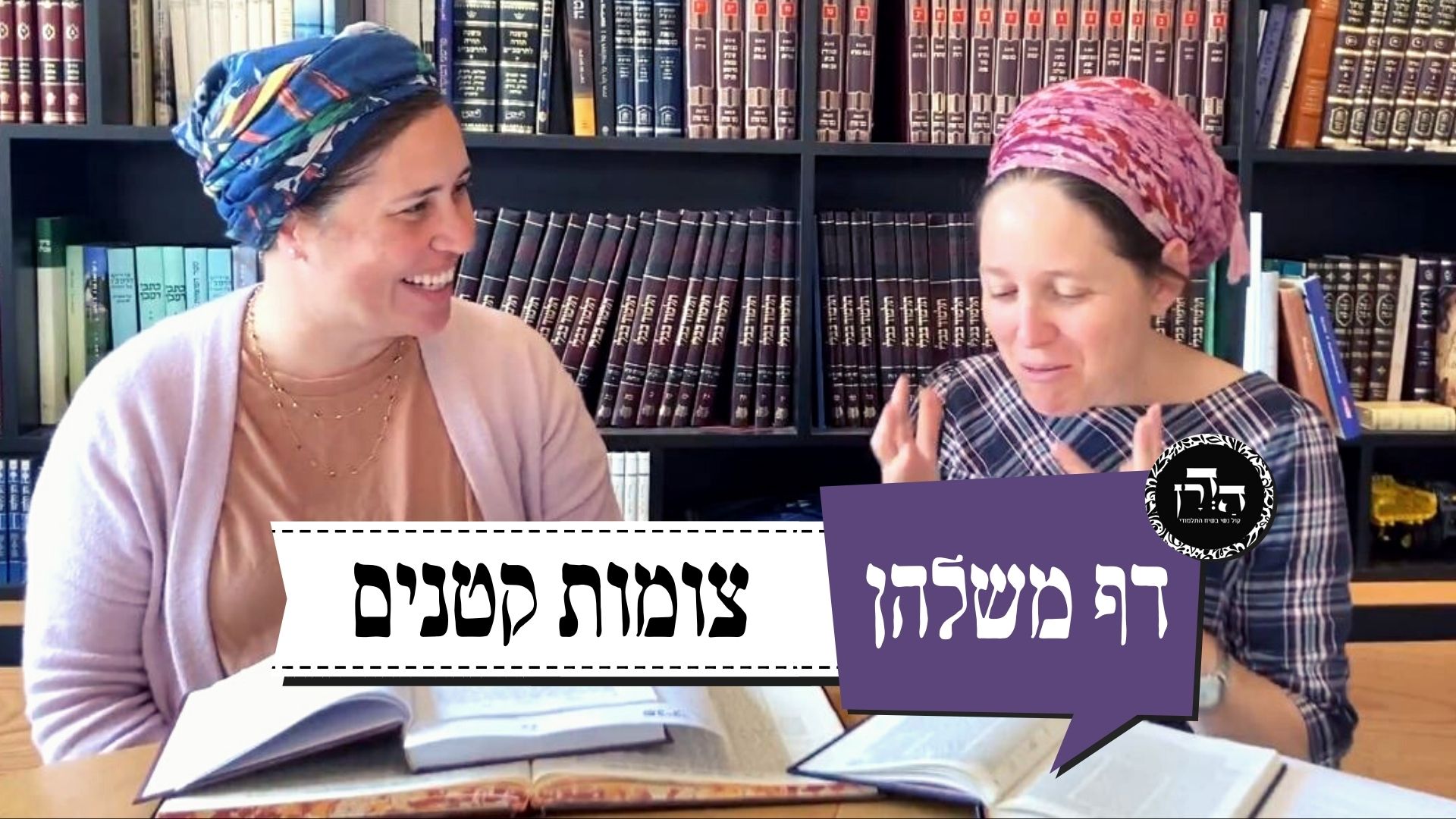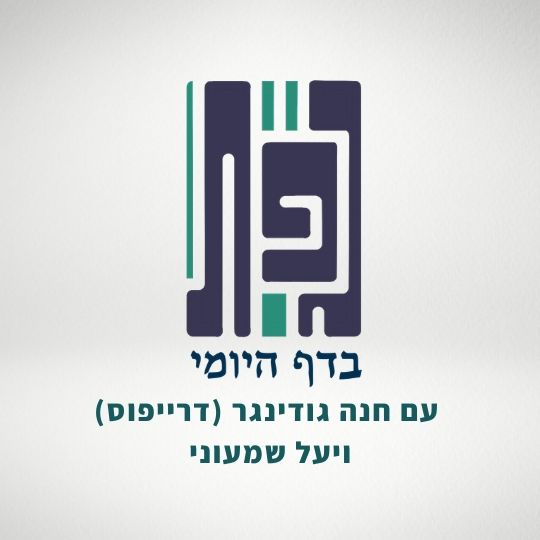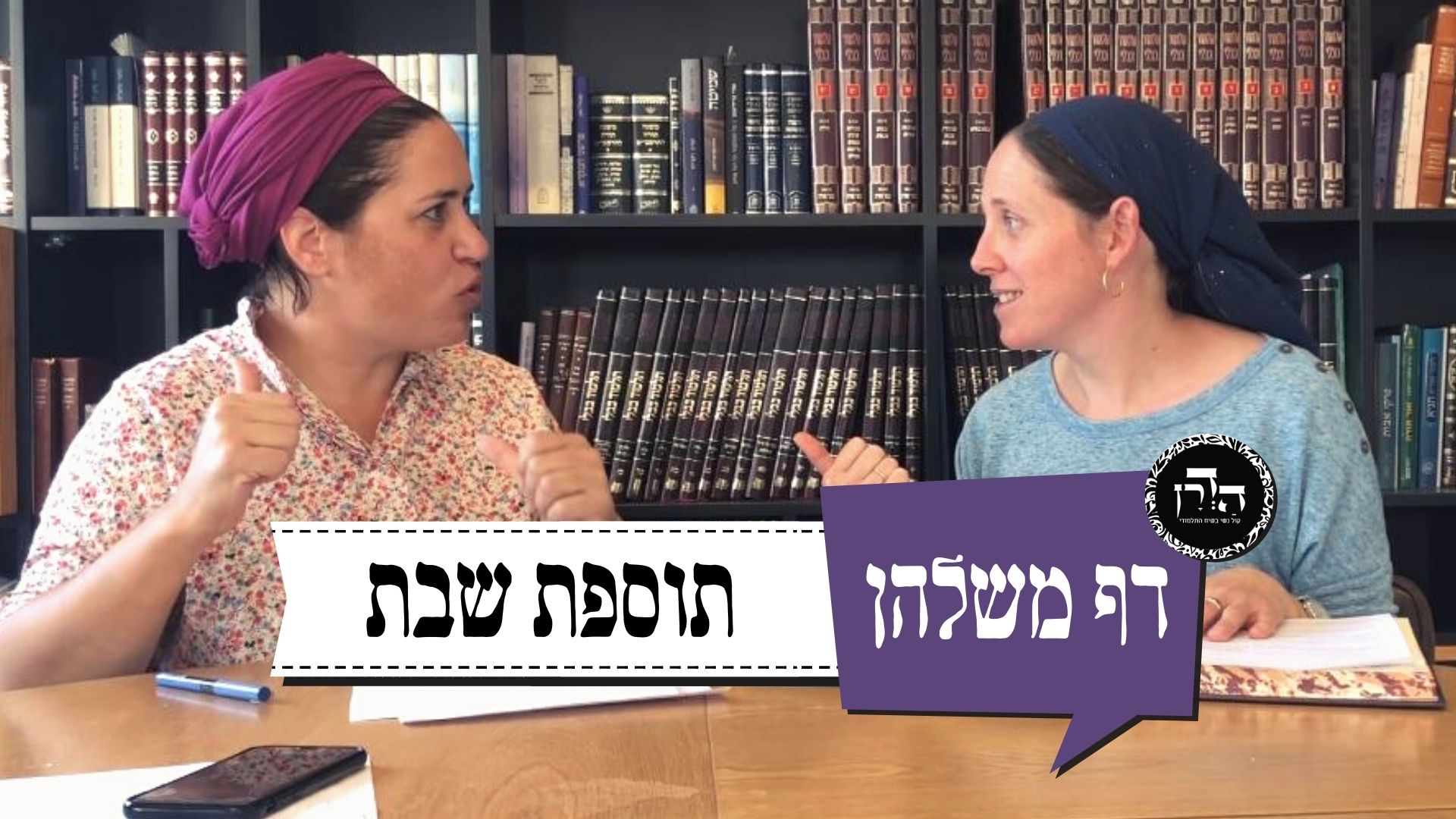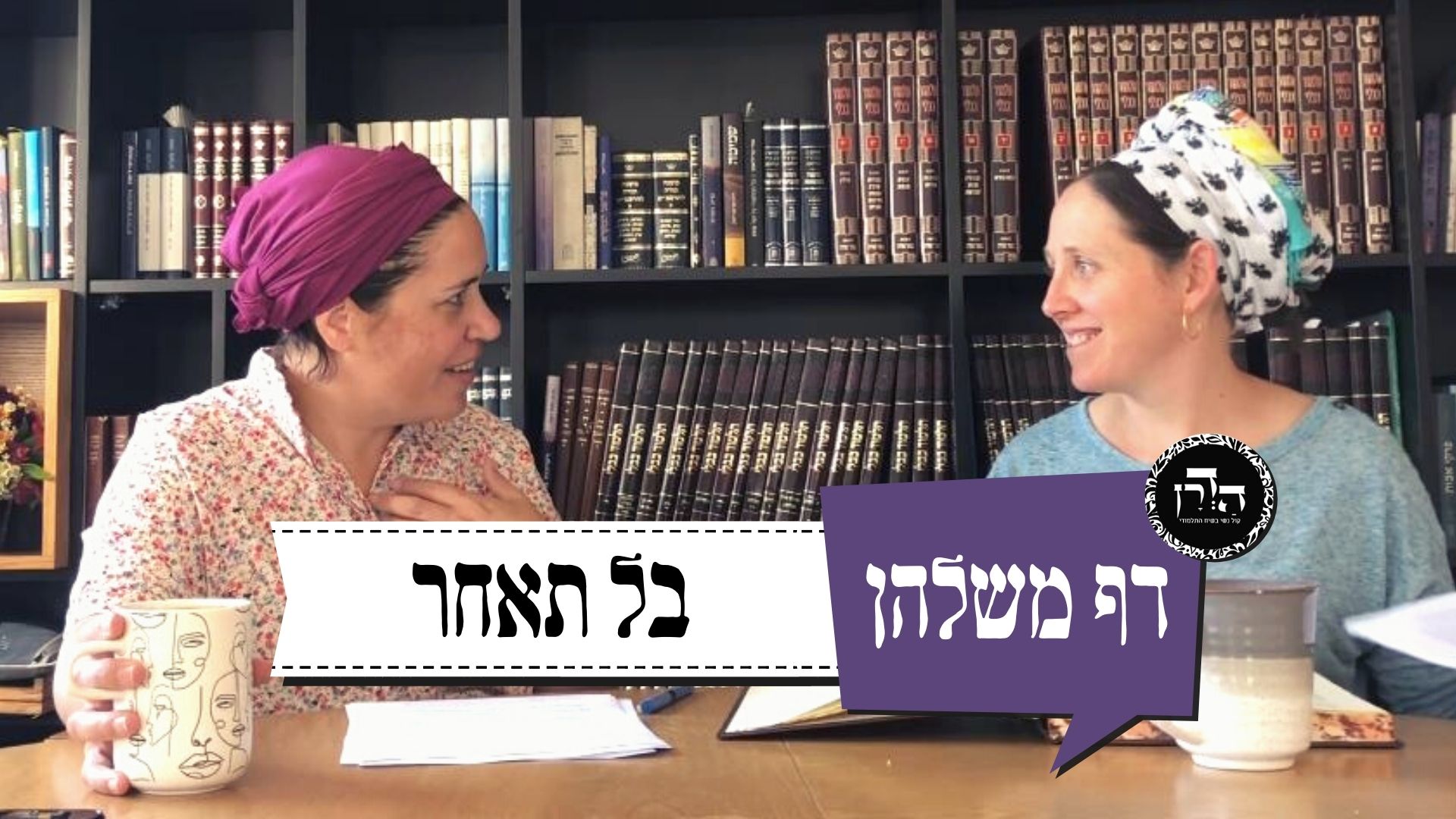ראש השנה כב
מַעֲשֶׂה שֶׁעָבְרוּ יוֹתֵר מֵאַרְבָּעִים זוּג וְעִיכְּבָן רַבִּי עֲקִיבָא כּוּ׳. תַּנְיָא, אָמַר רַבִּי יְהוּדָה: חַס וְשָׁלוֹם שֶׁרַבִּי עֲקִיבָא עִיכְּבָן. אֶלָּא שַׁזְפַּר רֹאשָׁהּ שֶׁל גֶּדֶר עִיכְּבָן, וְשִׁלַּח רַבָּן גַּמְלִיאֵל וְהוֹרִידוּהוּ מִגְּדוּלָּתוֹ.
§ It was taught in the mishna: There was once an incident where more than forty pairs of witnesses were passing through on their way to Jerusalem to testify about the new moon, and Rabbi Akiva detained them in Lod, telling them that there was no need for them to desecrate Shabbat for this purpose. It is taught in a baraita: Rabbi Yehuda said: Heaven forbid that Rabbi Akiva detained them, for he would certainly not have made such an error. Rather, it was that Zefer, the head of the city of Geder, detained them. And Rabban Gamliel sent and they removed him from his high office because he had acted inappropriately.
מַתְנִי׳ אָב וּבְנוֹ שֶׁרָאוּ אֶת הַחֹדֶשׁ — יֵלְכוּ. לֹא שֶׁמִּצְטָרְפִין זֶה עִם זֶה, אֶלָּא שֶׁאִם יִפָּסֵל אֶחָד מֵהֶן — יִצְטָרֵף הַשֵּׁנִי עִם אַחֵר. רַבִּי שִׁמְעוֹן אוֹמֵר: אָב וּבְנוֹ וְכׇל הַקְּרוֹבִין כְּשֵׁרִין לְעֵדוּת הַחֹדֶשׁ.
MISHNA: If a father and his son saw the new moon, they should both go to the court in Jerusalem. It is not that they can join together to give testimony, for close relatives are disqualified from testifying together, but they both go so that if one of them is disqualified, the second may join together with another witness to testify about the new moon. Rabbi Shimon says: A father and his son and all their relatives are fit to combine together as witnesses for testimony to determine the start of the month.
אָמַר רַבִּי יוֹסֵי: מַעֲשֶׂה בְּטוֹבִיָּה הָרוֹפֵא שֶׁרָאָה אֶת הַחֹדֶשׁ בִּירוּשָׁלַיִם, הוּא וּבְנוֹ וְעַבְדּוֹ מְשׁוּחְרָר, וְקִבְּלוּ הַכֹּהֲנִים אוֹתוֹ וְאֶת בְּנוֹ וּפָסְלוּ אֶת עַבְדּוֹ. וּכְשֶׁבָּאוּ לִפְנֵי בֵּית דִּין — קִבְּלוּ אוֹתוֹ וְאֶת עַבְדּוֹ, וּפָסְלוּ אֶת בְּנוֹ.
Rabbi Yosei said: There was an incident with Toviyya the doctor. When he saw the new moon in Jerusalem, he and his son and his freed slave all went to testify. The priests accepted him and his son as witnesses and disqualified his slave, for they ruled stringently that the month may be sanctified only on the basis of the testimony of those of Jewish lineage. And when they came before the court, they accepted him and his slave as witnesses and disqualified his son, due to the familial relationship.
גְּמָ׳ אָמַר רַבִּי לֵוִי: מַאי טַעְמָא דְּרַבִּי שִׁמְעוֹן, דִּכְתִיב: ״וַיֹּאמֶר ה׳ אֶל מֹשֶׁה וְאֶל אַהֲרֹן בְּאֶרֶץ מִצְרַיִם לֵאמֹר. הַחֹדֶשׁ הַזֶּה לָכֶם״ — עֵדוּת זוֹ תְּהֵא כְּשֵׁרָה בָּכֶם.
GEMARA: Rabbi Levi said: What is the reason for Rabbi Shimon’s opinion permitting relatives to jointly testify about the new moon, despite the fact that relatives are generally disqualified from testifying together? It is as it is written: “And the Lord spoke to Moses and Aaron in the land of Egypt, saying: This month shall be to you the beginning of months; it shall be the first month of the year to you” (Exodus 12:1–2). The words “to you” come to teach that this testimony concerning the new moon will be valid even when it is given by you two, i.e., Moses and Aaron, who are brothers and could not ordinarily testify together.
וְרַבָּנַן? עֵדוּת זוֹ תְּהֵא מְסוּרָה לָכֶם.
The Gemara asks: And with regard to the Rabbis, who disagree with Rabbi Shimon and prohibit relatives from testifying together about the new moon, how do they understand this verse? The Gemara answers: They interpret the verse as follows: This testimony is given over to you and others like you. That is to say, the months are to be established by the most outstanding authorities of each generation.
אָמַר רַבִּי יוֹסֵי מַעֲשֶׂה בְּטוֹבִיָּה הָרוֹפֵא כּוּ׳. אָמַר רַב חָנָן בַּר רָבָא: הִלְכְתָא כְּרַבִּי שִׁמְעוֹן. אֲמַר לֵיהּ רַב הוּנָא לְרַב חָנָן בַּר רָבָא: רַבִּי יוֹסֵי וּמַעֲשֶׂה, וְאַתְּ אָמְרַתְּ הִלְכְתָא כְּרַבִּי שִׁמְעוֹן?!
§ The mishna taught: Rabbi Yosei said: There was an incident with Toviyya the doctor. When he saw the new moon in Jerusalem, he and his son and his freed slave all went to testify. Rav Ḥanan bar Rava said: The halakha is in accordance with the opinion of Rabbi Shimon. Relatives are permitted to testify together about the new moon. Rav Huna said to Rav Ḥanan bar Rava: But Rabbi Yosei, whose position is usually accepted over those of his colleagues, ruled otherwise, and also, there was an incident in which the court actually ruled against Rabbi Shimon, and yet you say that the halakha is in accordance with the opinion of Rabbi Shimon?
אָמַר לוֹ: וְהָא זִמְנִין סַגִּיאִין אֲמַרִית קַמֵּיהּ דְּרַב הִלְכְתָא כְּרַבִּי שִׁמְעוֹן וְלָא אֲמַר לִי וְלָא מִידֵּי! אֲמַר לֵיהּ: הֵיכִי תָּנֵית? אֲמַר לֵיהּ: אִפְּכָא. אֲמַר לֵיהּ: מִשּׁוּם הָכִי לָא אֲמַר לָךְ וְלָא מִידֵּי. אָמַר טָבִי בְּרֵיהּ דְּמָרִי טָבִי אָמַר מָר עוּקְבָא אָמַר שְׁמוּאֵל: הִלְכְתָא כְּרַבִּי שִׁמְעוֹן.
Rav Ḥanan bar Rava said to him: But many times I said before Rav that the halakha is in accordance with the opinion of Rabbi Shimon on this matter, and never did he say anything to me to indicate that he disagreed. Rav Huna said to him: How did you teach the mishna? Rav Ḥanan bar Rava said to him: With the opposite attributions, that is say, the position that is attributed in the mishna to Rabbi Yosei, I would teach in the name of Rabbi Shimon. Rav Huna said to him: Due to that reason, he never said anything to you, for according to your version you ruled correctly. Tavi, son of Mari Tavi, said that Mar Ukva said that Shmuel said: The halakha is in accordance with the opinion of Rabbi Shimon.
מַתְנִי׳ אֵלּוּ הֵן הַפְּסוּלִין: הַמְשַׂחֵק בְּקוּבְיָא, וּמַלְוֵי בְּרִבִּית, וּמַפְרִיחֵי יוֹנִים, וְסוֹחֲרֵי שְׁבִיעִית, וַעֲבָדִים. זֶה הַכְּלָל: כׇּל עֵדוּת שֶׁאֵין הָאִשָּׁה כְּשֵׁירָה לָהּ, אַף הֵן אֵינָן כְּשֵׁירִין לָהּ.
MISHNA: The following are unfit to give testimony, as they are considered thieves and robbers: One who plays with dice [kubbiyya] or other games of chance for money; and those who lend money with interest; and those who race pigeons and place wagers on the outcome; and merchants who deal in produce of the Sabbatical Year, which may be eaten, but may not be an object of commerce; and slaves. This is the principle: Any testimony for which a woman is unfit, these too are unfit. Although in certain cases a woman’s testimony is accepted, e.g., to testify to the death of someone’s husband, in the majority of cases her testimony is not valid.
גְּמָ׳ הָא אִשָּׁה כְּשֵׁירָה לָהּ — אַף הֵן כְּשֵׁירִין לָהּ. אָמַר רַב אָשֵׁי: זֹאת אוֹמֶרֶת, גַּזְלָן דְּדִבְרֵיהֶם כְּשֵׁירִין לְעֵדוּת אִשָּׁה.
GEMARA: This implies that any testimony for which a woman is fit, these too are fit. Rav Ashi said: That is to say, one who is regarded as a robber by rabbinic law, i.e., one who illegally came into possession of money but did not actually steal it from another, is like those mentioned in the mishna. Although they are generally unfit to give testimony, they are fit to give testimony to enable a woman to remarry.
מַתְנִי׳ מִי שֶׁרָאָה אֶת הַחֹדֶשׁ וְאֵינוֹ יָכוֹל לְהַלֵּךְ — מוֹלִיכִים אוֹתוֹ עַל הַחֲמוֹר, אֲפִילּוּ בְּמִטָּה. וְאִם צוֹדֶה לָהֶם, — לוֹקְחִין בְּיָדָן מַקְלוֹת.
MISHNA: With regard to one who saw the new moon but is unable to go to Jerusalem by foot because he is sick or has difficulty walking, others may bring him on a donkey or even in a bed, even on Shabbat if necessary. And if the witnesses are concerned that bandits may be lying in wait for them along the road, they may take clubs or other weapons in their hands, even on Shabbat.
וְאִם הָיְתָה דֶּרֶךְ רְחוֹקָה — לוֹקְחִין בְּיָדָם מְזוֹנוֹת. שֶׁעַל מַהֲלַךְ לַיְלָה וָיוֹם, מְחַלְּלִין אֶת הַשַּׁבָּת וְיוֹצְאִין לְעֵדוּת הַחֹדֶשׁ, שֶׁנֶּאֱמַר: ״אֵלֶּה מוֹעֲדֵי ה׳ אֲשֶׁר תִּקְרְאוּ אוֹתָם בְּמוֹעֲדָם״.
And if it was a long journey to Jerusalem, they may take sustenance with them, although it is ordinarily prohibited to carry on Shabbat, since for a distance of a walk of a night and a day, the witnesses may desecrate Shabbat and go out to give testimony to determine the start of the month. This is as it is stated: “These are the Festivals of the Lord, sacred gatherings, which you shall declare in their seasons” (Leviticus 23:4). This teaches that, in all cases, the Festivals must be fixed at their proper times, even if it entails the transgression of Torah prohibitions.
הֲדַרַן עֲלָךְ אַרְבָּעָה רָאשֵׁי שָׁנִים
אִם אֵינָן מַכִּירִין אוֹתוֹ — מְשַׁלְּחִין עִמּוֹ אַחֵר לְהַעִידוֹ. בָּרִאשׁוֹנָה הָיוּ מְקַבְּלִין עֵדוּת הַחֹדֶשׁ מִכׇּל אָדָם. מִשֶּׁקִּלְקְלוּ הַבַּיְיתּוֹסִים, הִתְקִינוּ שֶׁלֹּא יְהוּ מְקַבְּלִין אֶלָּא מִן הַמַּכִּירִין.
MISHNA: If the members of the Great Sanhedrin in Jerusalem are not familiar with that one who saw the new moon, i.e., that he is a valid witness, the members of his local court of twenty-three send another with him to testify about him. The mishna adds: Initially, the court would accept testimony to determine the start of the month from any person, as all are presumed to be qualified witnesses, absent any disqualifying factors. However, when the Boethusians, a sect whose members had their own opinions with regard to the establishment of the Festivals, corrupted the process by sending false witnesses to testify about the new moon, the Sages instituted that they would accept this testimony only from those men familiar to the Sanhedrin as valid witnesses.
גְּמָ׳ מַאי אַחֵר? חַד,
GEMARA: The Gemara asks: What is the meaning of the statement in the mishna that another would be sent along to testify with regard to the qualification of the witness to the new moon? If it means that one other individual would be sent,
וְחַד מִי מְהֵימַן?! וְהָתַנְיָא: מַעֲשֶׂה שֶׁבָּא הוּא וְעֵדָיו עִמּוֹ לְהָעִיד עָלָיו! אָמַר רַב פָּפָּא: מַאי ״אַחֵר״ — זוּג אַחֵר.
but is one witness deemed credible? Isn’t it taught in a baraita: There was an incident in which one potential witness came to testify, and his witnesses were with him, as they came to testify about him? The use of the plural indicates that two witnesses are required to establish someone as a valid eyewitness. Rav Pappa said: What is the meaning of the term: Another? It means another pair of witnesses.
הָכִי נָמֵי מִסְתַּבְּרָא, דְּאִי לָא תֵּימָא הָכִי — ״אִם אֵינָן מַכִּירִין אוֹתוֹ״, מַאי ״אוֹתוֹ״? אִילֵּימָא ״אוֹתוֹ״ חַד — וְחַד מִי מְהֵימַן? ״מִשְׁפָּט״ כְּתִיב בֵּיהּ. אֶלָּא מַאי ״אוֹתוֹ״ — אוֹתוֹ הַזּוּג, הָכִי נָמֵי: מַאי ״אַחֵר״ — זוּג אַחֵר.
The Gemara comments: This too stands to reason, for if you do not say so, then the opening statement of the mishna: If the members of the Great Sanhedrin are not familiar with that one, is problematic. What is the meaning of the term: That one? If we say it is referring to that one witness, is one witness deemed credible? The word: Judgment, is written with regard to the establishment of the New Moon and Rosh HaShana: “For it is a statute for Israel, a judgment of the God of Israel” (Psalms 81:5), and judgments require two witnesses. Rather, what is the meaning of the term: That one? That pair of witnesses. So too here, what is the meaning of the term: Another? Another pair of witnesses.
וְחַד לָא מְהֵימַן? וְהָתַנְיָא: מַעֲשֶׂה בְּרַבִּי נְהוֹרַאי שֶׁהָלַךְ אֵצֶל הָעֵד לְהָעִיד עָלָיו בְּשַׁבָּת בְּאוּשָׁא!
The Gemara asks: And is one witness not deemed credible to testify about the eyewitness who saw the new moon? Isn’t it taught in a baraita: There was an incident involving Rabbi Nehorai, who went with the witness to testify about him on Shabbat in Usha? Apparently, Rabbi Nehorai offered his testimony alone.
אָמְרִי: רַבִּי נְהוֹרַאי סָהֲדָא אַחֲרִינָא הֲוָה בַּהֲדֵיהּ, וְהָא דְּלָא חָשֵׁיב לֵיהּ — מִשּׁוּם כְּבוֹדוֹ שֶׁל רַבִּי נְהוֹרַאי. רַב אָשֵׁי אָמַר: רַבִּי נְהוֹרַאי סָהֲדָא אַחֲרִינָא הֲוָה בְּאוּשָׁא, וַאֲזַל רַבִּי נְהוֹרַאי לְאִצְטְרוֹפֵי בַּהֲדֵיהּ.
The Sages say in explanation of this incident: In fact, two witnesses are necessary, and in the case of Rabbi Nehorai there was another witness with him. And the fact that he was not mentioned is due to the honor of Rabbi Nehorai, so as not to indicate that the other was his equal. Rav Ashi said: In the incident involving Rabbi Nehorai, there was already another witness waiting in Usha and Rabbi Nehorai went to join him.
אִי הָכִי, מַאי לְמֵימְרָא? מַהוּ דְּתֵימָא: מִסְּפֵיקָא לָא מְחַלְּלִינַן שַׁבְּתָא, קָא מַשְׁמַע לַן.
The Gemara asks: If so, what is the purpose of stating this incident at all? The Gemara answers: Lest you say that in a case of uncertainty one does not desecrate Shabbat, i.e., perhaps the witness in Usha would not be present that day, which would mean that Rabbi Nehorai desecrated Shabbat for no reason. Therefore, the Tosefta teaches us that for the important purpose of the New Moon, Shabbat may be desecrated even in a doubtful case.
כִּי אֲתָא עוּלָּא, אָמַר: קַדְּשׁוּהּ לְיַרְחָא בְּמַעְרְבָא. אָמַר רַב כָּהֲנָא: לָא מִיבַּעְיָא עוּלָּא, דְּגַבְרָא רַבָּה הוּא, דִּמְהֵימַן. אֶלָּא אֲפִילּוּ אִינִישׁ דְּעָלְמָא נָמֵי מְהֵימַן. מַאי טַעְמָא? כֹּל מִילְּתָא דַּעֲבִידָא לְאִגַּלּוֹיֵי — לָא מְשַׁקְּרִי בַּהּ אִינָשֵׁי. תַּנְיָא נָמֵי הָכִי: בָּא אֶחָד בְּסוֹף הָעוֹלָם וְאָמַר קִדְּשׁוּ בֵּית דִּין אֶת הַחֹדֶשׁ — נֶאֱמָן.
§ When Ulla came from Eretz Yisrael to Babylonia, he said: They sanctified the New Moon on a certain date in the West, Eretz Yisrael. Although Ulla was the only witness, his testimony was accepted. Rav Kahana said: It is not necessary to say that Ulla, who is a great man, is deemed credible with regard to such testimony. Rather, even an ordinary person is deemed credible in this case, and there is no need for two witnesses. What is the reason for this? With regard to any matter that is likely to be revealed, people do not lie about it. The Gemara comments that this is also taught in a baraita: If one person comes from the other end of the world and says: The court sanctified the new month, he is deemed credible. There is no need for two witnesses.
בָּרִאשׁוֹנָה הָיוּ מְקַבְּלִין עֵדוּת הַחֹדֶשׁ מִכׇּל אָדָם וְכוּ׳. תָּנוּ רַבָּנַן: מָה קִלְקוּל קִלְקְלוּ הַבַּיְיתּוֹסִין? פַּעַם אַחַת בִּקְּשׁוּ בַּיְיתּוֹסִין לְהַטְעוֹת אֶת חֲכָמִים, שָׂכְרוּ שְׁנֵי בְּנֵי אָדָם בְּאַרְבַּע מֵאוֹת זוּז, אֶחָד מִשֶּׁלָּנוּ, וְאֶחָד מִשֶּׁלָּהֶם.
The mishna taught: Initially, they would accept testimony to determine the start of the month from any person, and this continued until the Boethusians began to corrupt the process. The Sages taught a baraita that describes the decisive incident: What was the manner of the corruption in which the Boethusians engaged? Once, the Boethusians tried to mislead the Sages with regard to the day of the new moon. They hired two people for four hundred dinars to testify falsely that they had seen the new moon on the thirtieth day of the month. One of them was from our own, i.e., a member of the Pharisees and the Sages of Israel, and the other was one of theirs.
שֶׁלָּהֶם — הֵעִיד עֵדוּתוֹ וְיָצָא. שֶׁלָּנוּ, אָמְרוּ לוֹ: אֱמוֹר כֵּיצַד רָאִיתָ אֶת הַלְּבָנָה! אָמַר לָהֶם: עוֹלֶה הָיִיתִי בְּמַעֲלֵה אֲדוּמִּים, וּרְאִיתִיו שֶׁהוּא רָבוּץ בֵּין שְׁנֵי סְלָעִים, רֹאשׁוֹ דּוֹמֶה לְעֵגֶל, אׇזְנָיו דּוֹמִין לִגְדִי, קַרְנָיו דּוֹמוֹת לִצְבִי, וּזְנָבוֹ מוּנַּחַת לוֹ בֵּין יַרְכוֹתָיו, וְהֵצַצְתִּי בּוֹ וְנִרְתַּעְתִּי וְנָפַלְתִּי לַאֲחוֹרַי. וְאִם אֵין אַתֶּם מַאֲמִינִים לִי — הֲרֵי מָאתַיִם זוּז צְרוּרִין לִי בִּסְדִינִי.
When they went in to testify, their witness submitted his testimony that he had seen the new moon, and then he left. When our witness came to testify, they said to him, in the customary manner: Say how you saw the moon. He said to them: I was ascending in Ma’ale Adumim and I saw that the new moon was crouched between two rocks. Its head was like that of a calf, its ears were like those of a kid, its horns were like those of a deer, and its tail was lying between its thighs. And I looked at it and was frightened and I fell backward. And if you do not believe me that this is what I saw, there are two hundred dinars wrapped in my cloak that were paid to me to deliver this testimony.
אָמְרוּ לוֹ: מִי הִזְקִיקְךָ לְכָךְ? אָמַר לָהֶם: שָׁמַעְתִּי שֶׁבִּקְּשׁוּ בַּיְיתּוֹסִים לְהַטְעוֹת אֶת חֲכָמִים, אָמַרְתִּי: אֵלֵךְ אֲנִי וְאוֹדִיעַ לָהֶם, שֶׁמָּא יָבוֹאוּ בְּנֵי אָדָם שֶׁאֵינָם מְהוּגָּנִין וְיַטְעוּ אֶת חֲכָמִים.
Realizing that the testimony of the first witness was also false, the Sages said to him: Who persuaded you to act in this manner? He said to them: I heard that the Boethusians were seeking to mislead the Sages, and I said to myself: I will go and hire myself out to give false testimony, and I will inform the Sages of the truth, lest unworthy people come and mislead the Sages.
אָמְרוּ לוֹ: מָאתַיִם זוּז — נְתוּנִין לְךָ בְּמַתָּנָה, וְהַשּׂוֹכֶרְךָ יִמָּתַח עַל הָעַמּוּד. בְּאוֹתָהּ שָׁעָה הִתְקִינוּ שֶׁלֹּא יְהוּ מְקַבְּלִין אֶלָּא מִן הַמַּכִּירִין.
The Sages said to him: The two hundred dinars that you received from the Boethusians are given to you as a gift. Although you did not carry out your mission, the court is authorized to declare the money ownerless and award it to you. And the one who hired you shall be stretched out on the post for flogging. At that time the Sages instituted that they would accept testimony about the new moon only from those men who were familiar to the Great Sanhedrin as qualified witnesses.
מַתְנִי׳ בָּרִאשׁוֹנָה הָיוּ מַשִּׂיאִין מַשּׂוּאוֹת. מִשֶּׁקִּלְקְלוּ הַכּוּתִים, הִתְקִינוּ שֶׁיְּהוּ שְׁלוּחִין יוֹצְאִין.
MISHNA: Initially, after the court sanctified the new month they would light torches on the mountaintops, from one peak to another, to signal to the community in Babylonia that the month had been sanctified. After the Samaritans [Kutim] corrupted and ruined this method by lighting torches at the wrong times to confuse the Jews, the Sages instituted that messengers should go out to the Diaspora and inform them of the start of the month.
כֵּיצַד הָיוּ מַשִּׂיאִין מַשּׂוּאוֹת? מְבִיאִין כְּלוֹנְסָאוֹת שֶׁל אֶרֶז אֲרוּכִּין, וְקָנִים, וַעֲצֵי שֶׁמֶן, וּנְעוֹרֶת שֶׁל פִּשְׁתָּן. וְכוֹרֵךְ בִּמְשִׁיחָה וְעוֹלֶה לְרֹאשׁ הָהָר וּמַצִּית בָּהֶן אֶת הָאוּר. וּמוֹלִיךְ וּמֵבִיא וּמַעֲלֶה וּמוֹרִיד, עַד שֶׁהוּא רוֹאֶה אֶת חֲבֵירוֹ שֶׁהוּא עוֹשֶׂה כֵּן בְּרֹאשׁ הָהָר הַשֵּׁנִי, וְכֵן בְּרֹאשׁ הָהָר הַשְּׁלִישִׁי.
The mishna asks: How would they light the torches during that earlier period? They would bring items that burn well, e.g., long poles of cedar, reeds, pinewood, and beaten flax, and tie them together with a string. And someone would then ascend to the top of the mountain and light the torch on fire with them, and wave it back and forth and up and down, until he would see his colleague doing likewise on the top of the second mountain. In this manner he would know that the next messenger had received the message and passed it on. And similarly, the second torchbearer would wait for a signal from the one on the top of the third mountain, and so on. In this manner the message would reach the Diaspora.
וּמֵאַיִן הָיוּ מַשִּׂיאִין מַשּׂוּאוֹת? מֵהַר הַמִּשְׁחָה לְסַרְטְבָא, וּמִסַּרְטְבָא לִגְרוֹפִינָא, וּמִגְּרוֹפִינָא לְחַוְורָן, וּמֵחַוְורָן לְבֵית בִּלְתִּין, וּמִבֵּית בִּלְתִּין לֹא זָזוּ מִשָּׁם, אֶלָּא מוֹלִיךְ וּמֵבִיא וּמַעֲלֶה וּמוֹרִיד עַד שֶׁהָיָה רוֹאֶה כׇּל הַגּוֹלָה לְפָנָיו כִּמְדוּרַת הָאֵשׁ.
And from which mountains would they light the torches? They would transmit the message from the Mount of Olives in Jerusalem to Sartava, and from Sartava to Gerofina, and from Gerofina to Ḥavran, and from Ḥavran to Beit Baltin. And from Beit Baltin they would not move to light torches in any other predetermined location. Rather, the one who was appointed for this task would wave the torch back and forth and up and down, until he would see the entire Diaspora before him alight like one large bonfire, as they would light torches to continue transmitting the message from place to place all the way to the farthest reaches of the Diaspora.
גְּמָ׳ מַאי מַשְׁמַע דְּ״מַשִּׂיאִין״ לִישָּׁנָא דִּיקוֹד הוּא? דִּכְתִיב: ״וַיִּשָּׂאֵם דָּוִד וַאֲנָשָׁיו״, וּמְתַרְגְּמִינַן: וְאוֹקְדִינֻן דָּוִד.
GEMARA: The mishna taught that they would light torches [masi’in]. The Gemara asks: From where may it be inferred that the term masi’in is an expression of burning? As it is written: “Vayisa’em David and his men” (II Samuel 5:21), and we translate the verse as: And David and his men burned them.
תָּנוּ רַבָּנַן: אֵין מַשִּׂיאִין מַשּׂוּאוֹת אֶלָּא עַל הַחֹדֶשׁ שֶׁנִּרְאָה בִּזְמַנּוֹ לְקַדְּשׁוֹ. וְאֵימָתַי מַשִּׂיאִין — לְאוֹר עִיבּוּרוֹ.
The Sages taught in a baraita: Torches were lit only for a new month whose moon was seen at its proper time, i.e., on the thirtieth day of the outgoing month, to sanctify the upcoming New Moon on that date and declare the previous month as containing twenty-nine days. In this case, the thirtieth day would be declared the first day of the following month. And when would they light the torches? It was on the eve of its additional day, the one that would have been added had it been a full, thirty-day month, i.e., on the eve of the thirty-first day of the outgoing month.
לְמֵימְרָא דְּאַחָסֵר עָבְדִינַן, אַמָּלֵא לָא עָבְדִינַן. מַאי טַעְמָא? אָמַר רַבִּי זֵירָא: גְּזֵירָה מִשּׁוּם רֹאשׁ חֹדֶשׁ חָסֵר שֶׁחָל לִהְיוֹת בְּעֶרֶב שַׁבָּת. אֵימַת עָבְדִי — בְּאַפּוֹקֵי שַׁבְּתָא. דְּאִי אָמְרַתְּ נַעֲבֵיד נָמֵי אֲמַלֵּא — אָתוּ
The Gemara asks: Is this to say that for the conclusion of a deficient month of twenty-nine days one performs the sequence of lighting torches, but for a full month one does not perform it? What is the reason for this? Rabbi Zeira said: This is a rabbinic decree that was instituted due to the case of a New Moon following a deficient, twenty-nine-day month that occurs on Shabbat eve. In that case, when do they perform the lighting? At the conclusion of Shabbat, as it is prohibited to light a fire on Friday night. The reason for the decree is that if you say that one performs the lighting of torches for a full, thirty-day month as well, people might come



